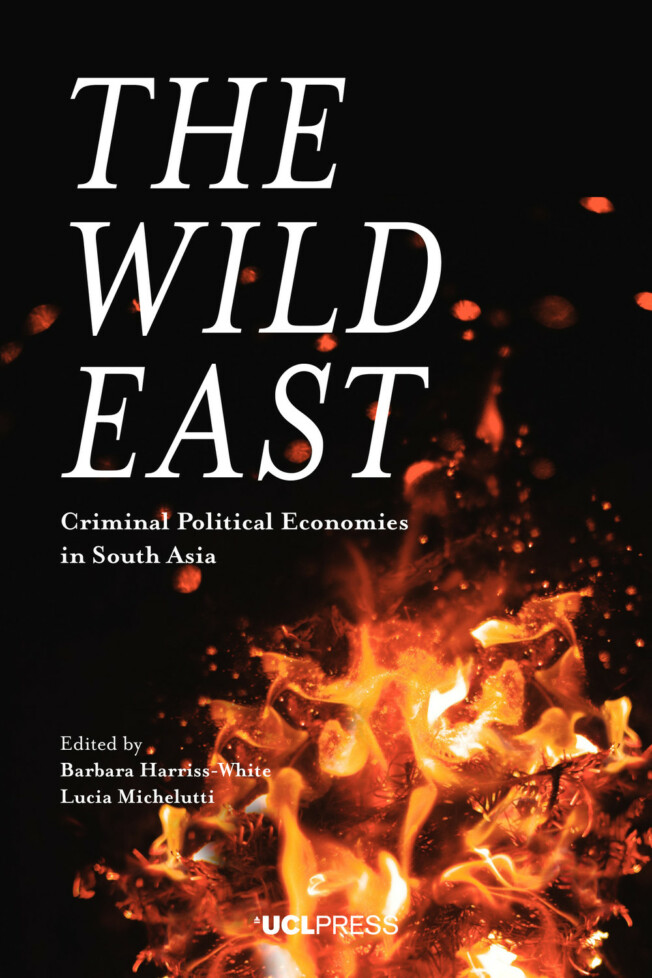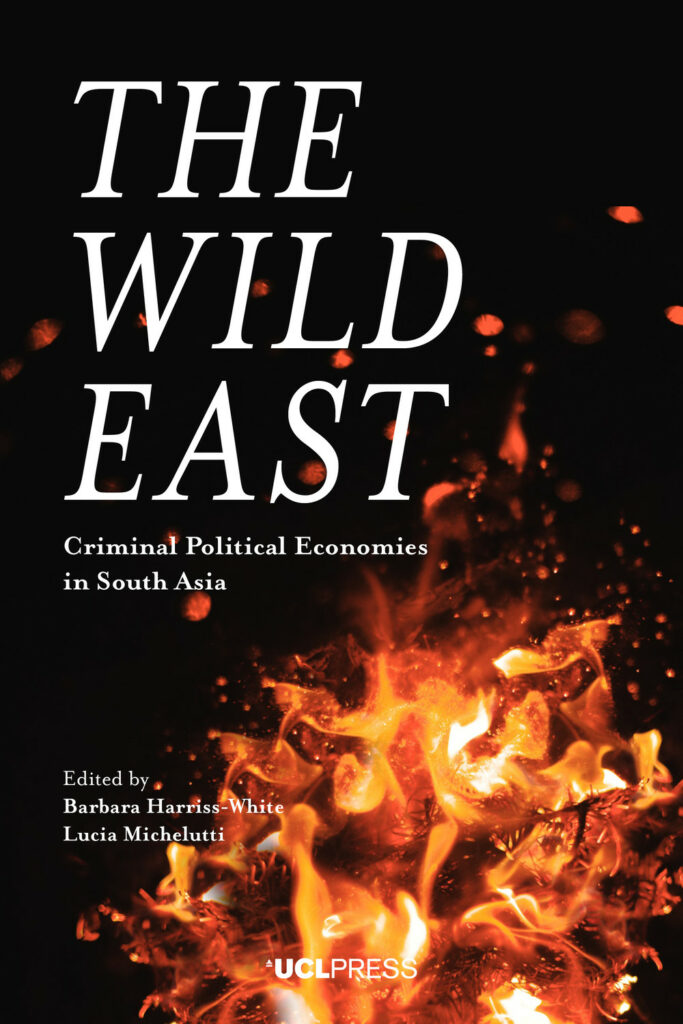
The Wild East
Criminal Political Economies in South Asia
Barbara Harriss-White (Editor), Lucia Michelutti (Editor)
The Wild East bridges political economy and anthropology to examine a variety of il/legal economic sectors and businesses such as red sanders, coal, fire, oil, sand, air spectrum, land, water, real estate, procurement and industrial labour. The eleven case studies, based across India, Pakistan and Bangladesh, explore how state regulative law is often ignored and/or selectively manipulated. The emerging collective narrative shows the workings of regulated criminal economic systems where criminal formations, politicians, police, judges and bureaucrats are deeply intertwined.
By pioneering the field-study of the politicisation of economic crime, and disrupting the wider literature on South Asia’s informal economy, The Wild East aims to influence future research agendas through its case for the study of mafia-enterprises and their engagement with governance in South Asia and outside. Its empirical and theoretical contribution to debates about economic crimes in democratic regimes will be of critical value to researchers in Economics, Anthropology, Sociology, Comparative Politics, Political Science and International Relations, Criminologists and Development Studies, as well as to those inside and outside academia interested in current affairs and the relationship between crime, politics and mafia enterprises.
Praise for The Wild East
‘This volume is a useful corrective to narratives, oriented on the corporate sector and national politics, which do not tell the full story of the Indian economy. The Wild East reminds us, forcefully, that India’s economy and politics have regional and local aspects that need to be kept in view.’ Commonwealth & Comparative Politics
‘This grimly fascinating book showcases cutting-edge research on the close links between criminality and capitalism in contemporary South Asia. These searing accounts of “the normalization of criminal accumulation” need to be read and understood as much by citizens as by those claiming to represent them.’
Jayati Ghosh, Jawaharlal Nehru University, New Delhi
‘A fascinating grasp of the symbiosis of state and criminal power. Eleven case studies across India, Pakistan and Bangladesh allow us to delve into unwritten rules and open secrets of everyday criminal economies and political machineries of the Wild East. Conceptual framing of the book, reminding the Wild West of its own trajectories, will certainly appeal to those disenchanted with normative, top-down, Washington consensus based discourses.’
Alena Ledeneva, Founder of the UCL Global Informality Project
Introduction
Barbara Harriss-White and Lucia Michelutti
1. The criminal economics and politics of black coal in Jharkhand, 2014
Nigel Singh and Barbara Harriss-White
2. Jharia’s century-old fire kept ablaze by crime and politics
Smita Gupta
3. Sand and the Politics of Plunder in Tamil Nadu, India
J. Jeyaranjan
4. Himalayan Hydro-criminality: Dams, Development and Politics in Arunachal Pradesh, India
Deepak K Mishra5. Crime in the Air: Spectrum Markets and the Telecommunications Sector in India
Jai Bhatia6. The inter-State criminal life of sand and oil in North India, western Uttar Pradesh
Lucia Michelutti7. Red sanders mafia’ in South India Violence, electoral democracy and labour
David Picherit8. ‘The Land and Real Estate Mafia’, East India, West Bengal
Tone K. Sissener
9. Politics, Capital, and Land Grabs in Punjab, India
Nicolas Martin
10. The Politics of Contracting inProvincial Bangladesh
Arild Engelsen Ruud
11. Putting Out the Baldia Factory Fire: How the Trial of Karachi’s Industrial Capitalism Did Not Happen
Laurent Gayer
DOI: 10.14324/111.9781787353237
Number of pages: 380
Number of illustrations: 1
Publication date: 23 September 2019
PDF ISBN: 9781787353237
EPUB ISBN: 9781787353268
Hardback ISBN: 9781787353251
Paperback ISBN: 9781787353244
Barbara Harriss-White (Editor)
Barbara Harriss-White is Emeritus Professor of Development Studies, Emeritus Fellow of Wolfson College, Oxford, Professorial Research Associate at SOAS and Visiting Professor at JNU. She has written, edited or co-edited and published 40 books and major reports, published over 250 scholarly papers and chapters and over 80 working papers. Her book, Rural Commercial Capital, won the Edgar Graham prize. Through field research, she works on India’s political economy, in particular the agricultural and informal economy and aspects of deprivation and of waste.
Lucia Michelutti (Editor)
Lucia Michelutti is Professor of Anthropology at University College London (UCL). Her research expertise spans from political and legal anthropology to the ethnographic study of informal economies as well as the anthropology of caste, kingship and ritual. She has carried out extensive fieldwork in North India and has worked in Venezuela and on South Asia and Latin America in comparative contexts. She is currently the Principal Investigator of the project ‘Anthropologies of Extortion’ (2021-2026) funded by the European Research Council.
‘This volume is a useful corrective to narratives, oriented on the corporate sector and national politics, which do not tell the full story of the Indian economy. The Wild East reminds us, forcefully, that India’s economy and politics have regional and local aspects that need to be kept in view.’
Commonwealth & Comparative Politics
‘This grimly fascinating book showcases cutting-edge research on the close links between criminality and capitalism in contemporary South Asia. These searing accounts of “the normalization of criminal accumulation” need to be read and understood as much by citizens as by those claiming to represent them.’ – Jayati Ghosh, Jawaharlal Nehru University, New Delhi
‘A fascinating grasp of the symbiosis of state and criminal power. Eleven case studies across India, Pakistan and Bangladesh allow us to delve into unwritten rules and open secrets of everyday criminal economies and political machineries of the Wild East. Conceptual framing of the book, reminding the Wild West of its own trajectories, will certainly appeal to those disenchanted with normative, top-down, Washington consensus based discourses.’ – Alena Ledeneva, Founder of the UCL Global Informality Project
Related titles
The Wild East
Criminal Political Economies in South Asia
The Wild East bridges political economy and anthropology to examine a variety of il/legal economic sectors and businesses such as red sanders, coal, fire, oil, sand, air spectrum, land, water, real estate, procurement and industrial labour. The eleven case studies, based across India, Pakistan and Bangladesh, explore how state regulative law is often ignored and/or selectively manipulated. The emerging collective narrative shows the workings of regulated criminal economic systems where criminal formations, politicians, police, judges and bureaucrats are deeply intertwined.
By pioneering the field-study of the politicisation of economic crime, and disrupting the wider literature on South Asia’s informal economy, The Wild East aims to influence future research agendas through its case for the study of mafia-enterprises and their engagement with governance in South Asia and outside. Its empirical and theoretical contribution to debates about economic crimes in democratic regimes will be of critical value to researchers in Economics, Anthropology, Sociology, Comparative Politics, Political Science and International Relations, Criminologists and Development Studies, as well as to those inside and outside academia interested in current affairs and the relationship between crime, politics and mafia enterprises.
Praise for The Wild East
‘This volume is a useful corrective to narratives, oriented on the corporate sector and national politics, which do not tell the full story of the Indian economy. The Wild East reminds us, forcefully, that India’s economy and politics have regional and local aspects that need to be kept in view.’ Commonwealth & Comparative Politics
‘This grimly fascinating book showcases cutting-edge research on the close links between criminality and capitalism in contemporary South Asia. These searing accounts of “the normalization of criminal accumulation” need to be read and understood as much by citizens as by those claiming to represent them.’
Jayati Ghosh, Jawaharlal Nehru University, New Delhi
‘A fascinating grasp of the symbiosis of state and criminal power. Eleven case studies across India, Pakistan and Bangladesh allow us to delve into unwritten rules and open secrets of everyday criminal economies and political machineries of the Wild East. Conceptual framing of the book, reminding the Wild West of its own trajectories, will certainly appeal to those disenchanted with normative, top-down, Washington consensus based discourses.’
Alena Ledeneva, Founder of the UCL Global Informality Project
‘This volume is a useful corrective to narratives, oriented on the corporate sector and national politics, which do not tell the full story of the Indian economy. The Wild East reminds us, forcefully, that India’s economy and politics have regional and local aspects that need to be kept in view.’
Commonwealth & Comparative Politics
‘This grimly fascinating book showcases cutting-edge research on the close links between criminality and capitalism in contemporary South Asia. These searing accounts of “the normalization of criminal accumulation” need to be read and understood as much by citizens as by those claiming to represent them.’ – Jayati Ghosh, Jawaharlal Nehru University, New Delhi
‘A fascinating grasp of the symbiosis of state and criminal power. Eleven case studies across India, Pakistan and Bangladesh allow us to delve into unwritten rules and open secrets of everyday criminal economies and political machineries of the Wild East. Conceptual framing of the book, reminding the Wild West of its own trajectories, will certainly appeal to those disenchanted with normative, top-down, Washington consensus based discourses.’ – Alena Ledeneva, Founder of the UCL Global Informality Project

